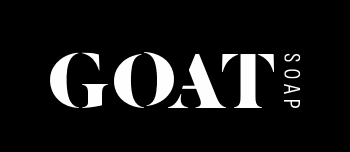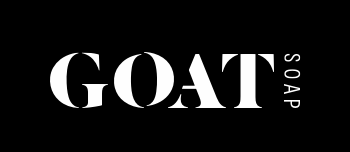Now more than ever there is a real focus on where our food comes from, what is in it and whether it is sustainable and cruelty free. While you may be on board with checking your food for additives and sustainability, what about your skin products? Specifically, your soap. Familiarizing yourself with the ingredients on your favorite soap could have you making different choices in the next shop. If you believe in using the most natural, cruelty free and sustainably sourced products with recognizable ingredients, then GOAT Soap should be top of your list.
What’s In A Name?
We’ve all likely seen the lovely handcrafted, rough-hewn soaps at our local fair-trade market with the rich smells and package promises of being kind to our skin. Are they really that different from mass produced, store bought soap though? Do we get the same result with our budget pack of 10 that we do with the handmade soap?
Ultimately, it comes down to ingredients. Not all soaps are the same, some are not truly deserving of being called soap. Some are in fact closer to the detergent we use to clean our dishes. It’s at this point that it becomes clear how much ingredients matter. Harsh detergents designed to strip an oily cooking pan should not be used to cleanse the skin. If your favorite soap’s packaging refers to it as a ‘beauty bar’ or ‘cleansing bar’ likelihood is that it doesn’t meet the minimum requirements to be called soap. Meaning it could be a lot less kind to your skin than you first thought.
Regulations relating to what can be called ‘soap’ are controlled by The FDA (Food and Drug Administration). If this word is missing from your packaging, you may in fact be cleansing with detergent sold under another name.
Why Is Standard Soap So Bad For Our Skin?
Detergents or surfactants dry out and strip the skin by decreasing the surface tension of the water on our skin. This allows oil and water to mix easily and wash away. On skin, we need minimal surfactants when compared to a greasy plate, so it is better to choose a soap that doesn’t use harsh detergents. Most synthetic detergents are made from petrochemicals which is just another reason to avoid them.
In addition to detergents, there is an excessive number of chemical additives in most soaps:
- Sodium, multiple varieties, essentially just salt and a lot of it. Very drying and irritating to skin. Used to stabilize and thicken soap.
- Synthetic fragrances which can cause allergies, headaches, nausea, skin inflammation and more.
- Preservatives and acids that cause skin inflammation and itching.
- Titanium dioxide to make the soap whiter and brighter in appearance, also used in commercial house paints.
These are just a few of the ingredients explained in very simple terms. Our skin absorbs a huge percentage of what we put on it. So much so that medications can even be given via skin patch to the same effectiveness as oral medication. With this in mind, it begs the question - Why put these chemicals on our skin? We wouldn’t ingest them, so we shouldn’t use them on ourselves.
The Difference With Goats Milk Soap
GOAT Soap is made using the ancient method of saponification. GOAT Soap is made using cruelty free, organic goat milk. This combination mixed with other all natural ingredients brings you the purest soap possible.
We are honest about what goes into our product, no hidden ingredients. Our packaging states the ingredients in their entirety to give peace of mind. They include:
- Shea butter
- Cocoa butter
- Coconut oil
- Palm oil
- Safflower oil
- Castor oil
- Olive oil
- Pure essential oils for fragrance (Lavender, Lemongrass Citrus, Peppermint Tea Tree, Patchouli)
In a process we have perfected over 10 years, these ingredients are combined with lye (an alkali traditionally obtained by leaching wood ashes) to create our nourishing GOAT Soap. The mixture of oils with the goat milk creates a moisturizing, gentle soap that is safe enough to use on babies, the elderly or inflamed skin.
So How Does It Work?
Being devoid of detergents and synthetic, soap like ingredients doesn’t reduce GOAT Soap’s cleansing power. Goat milk is full of alpha-hydroxy acids that break down dead skin cells and allow them to shed. This means you don’t need harsh exfoliants or detergents to have wonderfully clean skin. The presence of essential vitamins A, B1, B6, B12, C, D and E encourages fresh new skin to appear plumper and brighter than ever.
Goat milk is also a natural emollient (moisturizer) that actually puts moisture back into the skin as you wash. Its PH is about as close to human skin as possible, meaning it helps restore the balance of our skin’s microbiome instead of interrupting it. The best part is that it is also naturally hypoallergenic, anti-bacterial and anti-inflammatory meaning it is suitable for every age and skin type. It won’t just cleanse your skin, it will improve it.

